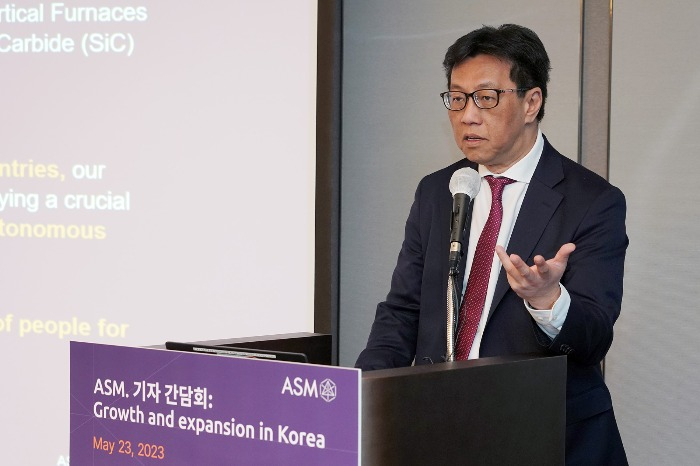Electronics
ASM to invest $100 mn to expand R&D facilities in S.Korea
The Netherlands-based global maker of chip equipment will build its second manufacturing innovation center in a Seoul suburb
By May 24, 2023 (Gmt+09:00)
2
Min read
Most Read
LG Chem to sell water filter business to Glenwood PE for $692 million


Kyobo Life poised to buy Japan’s SBI Group-owned savings bank


KT&G eyes overseas M&A after rejecting activist fund's offer


StockX in merger talks with Naver’s online reseller Kream


Mirae Asset to be named Korea Post’s core real estate fund operator



The Netherlands-based semiconductor equipment maker ASM will invest $100 million (132 billion won) to boost its R&D and production capacities in South Korea.
CEO Benjmain Loh on Tuesday told a news conference at Josun Palace Hotel in Seoul that ASM's second domestic center for manufacturing research and innovation will be completed by 2025 in Hwaseong, Gyeonggi Province, with the R&D facility area to be double that of the first center and the production space triple.
ASM will invest $100 million to build the center.
Last year, ASM was the world's No. 7 maker of semiconductor equipment maker in annual sales. In 1984, the company and Philips formed ASML, which is known for extreme ultraviolet exposure equipment.
ASM mainly produces equipment used for deposition, or the process of coating thin film from a range of materials in the chip manufacturing process so that wafers, or semiconductor discs, have electrical properties. The company's recent focus is atomic layer deposition (ALD) equipment, which stacks atomic layers on a wafer and coats it with thin film.
ASM is conducting R&D and production of plasma-enhanced ALD (PEALD) equipment solely in South Korea. Its additional investment of $100 million seeks to develop the country as a key base for PEALD equipment, demand for which is growing from semiconductor makers.
PEALD is used in all memory semiconductors such as DRAMs and 3D NANDs and advanced system chips, Loh said, and ASM decided to expand its PEALD facility given rising demand.
He added that the decision to strongly invest in South Korea stemmed from the nation's abundance of highly skilled talent, with clients like Samsung Electronics and SK Hynix requesting additional investment.
On the state of the semiconductor industry, the CEO predicted sluggishness this year but recovery from next year due to higher chip demand over the mid- to long term thanks to advances in 5G, electric vehicles and generative artificial intelligence.
The global chip market will approach $1 trillion (1.3 quadrillion won) in value by 2030 after reaching an estimated $600 billion this year, he added.
On US restrictions on chip equipment exports to China, Loh said business in that market will continue since the regulations target cutting-edge semiconductor equipment, not those related to chips used in general products.
Write to Jeong-Soo Hwang at hjs@hankyung.com
More to Read
-
 ConstructionSsangyong E&C wins contract for building ASML Korea campus
ConstructionSsangyong E&C wins contract for building ASML Korea campusMar 13, 2023 (Gmt+09:00)
1 Min read -
 Korean chipmakersSamsung ‘demanding customer’ for ASML as orders rise
Korean chipmakersSamsung ‘demanding customer’ for ASML as orders riseFeb 20, 2023 (Gmt+09:00)
3 Min read -
 Korean chipmakersIntel’s curious revelation of its ASML deal raises questions
Korean chipmakersIntel’s curious revelation of its ASML deal raises questionsJan 21, 2022 (Gmt+09:00)
1 Min read
Comment 0
LOG IN


